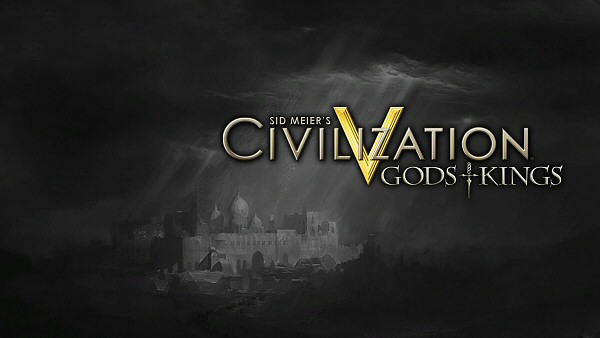
Sid Meier’s Civilization 4 is considered by many as one of the best strategy games ever created, which got even better with Beyond the Sword, Civ4’s 2nd expansion. The bar was very high, so, it was surely no easy task to improve a series that felt already so complete, and for many, perfect.
Civ’s new releases are never consensual, or smooth. I remember that Civ3 had many issues when it was first released and Civ4 also had a few bumps on the road upon release. But, as far as I can remember, the most controversial of all Civ releases has been this 5th installment.
When Civilization 5 came out it was highly praised by the critics from whom it received very good reviews. But, many players thought otherwise and gave this 5th installment mixed and even negative reviews, some of which even quite violent especially from the series’ hardcore fans.
I felt that Civ5 was a good game, but not that great, especially if you had in-depth experience from the series’ previous games. So, I gave it an 8.4 score. Not for its brilliant balancing, AI strength or replayability factors, but for its production value (overall quality and attention to details) and above all for some of its innovation aspects, which in my opinion were quite bold and refreshing, namely the introduction of City-States and the 1UPT system (one unit per tile). And, to someone new to the Civilization series this was surely a great game to pick up on. Actually I received very positive feedback from a couple of gamers, experienced ones, that didn’t know the series until then.
But, Civ5 did have some serious problems upon release. Diplomacy didn’t feel right and combat had many shortcomings. And, frankly, there was not that much to do between turns since some mechanics were taken out from the last installments (like religion and espionage) and so we could easily get bored after a while.
So, the question now is: did 2K Games and Firaxis fix these shortcomings with Civ5:G&K? For the hasty the answer is yes, to a good extent. For the not so hasty keep on reading to find out why I consider Civ5:G&K a much better experience than the original Civ5 game, and, above all, to know if it’s worth it or not to jump back on the boat.
New Civilizations to play with
Civ5:G&K comes with 9 new civilizations: The Netherlands, Celts, Byzantium, Carthage, Huns, Austria, the Maya, Sweden and Ethiopia. The expansion also includes 2 additional Civs: Spain and Mongolia, both previously available as DLC for the original game. This offers a total of 11 new civilizations.
This is an impressive number of new Civs and respective leaders which represent plenty more options to choose from and play against. As always each leader has its own personality (play style), specific units, buildings and traits. Some are more aggressive and desire your land more, like Atilla the Hun or Genghis Khan the Mongol, others look more peaceful and are more subtle, like the Swede Gustavus or Dido from Carthage. I think the new Civs are quite worth it. I played with some of them, and more importantly against them, and felt that they are surely not just a bunch of placeholder Civs to fill the bag, which is a big plus for Civ5:G&K. Below, Atilla the Hun.
Religion is back, and it’s deeper now
Religion is a cornerstone of our civilization, no one can deny that. And that’s why it was such a well received feature in Civilization 4, where it first made its appearance, but not without its shortcomings. Some found its implementation a bit too shallow. Basically when you found a religion in Civ4 you gain a sum of gold each turn and you can spread your religion locally for a happiness boost or abroad for diplomatic purposes. I think the concept was fine and religion did serve its purpose. But, it lacked a bit of flavor perhaps, since all religions were basically the same.
The entire concept of religion was taken out in Civ5. This was quite a shock for many people that were so used to creating friends and foes with this mechanic. The system was not perfect alright, but at least it gave you something extra to do while you waited for your armies and buildings to finish. And, it was actually quite fun to convert foreign cities, to forge alliances and conduct holy wars. But that was no more. Now, fortunately, it’s back again in Civ5:G&K, but not without suffering a major facelift, and a few enhancements.
There’s a new resource now called faith, and everything in this new religious concept works with it one way or the other. Faith is generated in many ways but most of which through religious buildings. With faith you can generate great prophets to found and enhance your religion, recruit missionaries to spread it, pay inquisitors to remove a hostile faith, generate great people and construct religious buildings. So, besides spreading your religion you can use faith for other things. The design decision to allow the player to generate great people with accumulated faith in particular was a very clever one in my opinion since it successfully extends the religion usefulness throughout most of the game length, perhaps more than in Civ4.
Civ5:G&K’s religion basically works like this: You start small with a simple Pantheon which you can upgrade later on to a full religion. A Pantheon allows you to choose one belief. A religion allows up to four or even five beliefs if you play with the Byzantine. A belief is a trait you choose that gives you an additional bonus. There are beliefs that grant you extra gold, food or culture while others will allow you to build special buildings like cathedrals or mosques that give you a boost to happiness, culture and more faith. These last buildings can only be constructed through these beliefs and not through technology breakthrough, as before in Civ4.
Overall I found Civ5:G&K’s religion subsystem to be quite rewarding and deep. I think it’s far better than Civ4’s because it gives you more to choose from and allows you to do more things. In Civ4 religion was mostly useful for diplomacy and population happiness purposes. Civ5:G&K gives you that plus the ability to generate great people in later game eras. It also lets you refine your religion with up to 5 beliefs (or bonuses) and even raise armies with accumulated faith if you choose the right beliefs.
Espionage is also back, simplified but elegant
Espionage was also forgotten in Civ5. It was not a consensual subsystem in Civ4 (it never is in strategy games) but it had its purposes, and it was another one of those useful things that you could do during later game phases.
Espionage has been re-included in Civ5:G&K, and it has been streamlined, meaning reduced to essentials, or simplified. In Civ4:BTS you could recruit spies to conduct an array of espionage missions: from sabotaging production, stealing technology, surveillance (the ability to see a rival city), poisoning the water supply, inciting revolt and others. You could also destroy improvements with spies, which allowed you to make a serious blow on the enemy’s supply lines by cutting out their strategic resource supplies. There was also an espionage resource called “espionage points” that you needed to accumulate by directing gold to espionage operations. You could also decide to focus your espionage spending on particular rivals for better outcome.
From all these Civ4 espionage features only two made it to Civ5:G&K. These are: surveillance and technology stealing. Now you can’t recruit spies, they are given to you according to the game era you are in. You start with only one spy when someone enters the Renaissance era but you will be given more throughout the remaining game eras. The idea is for Espionage to kick in when religion starts to phase out but there is quite a large period of time where both are used quite actively.
Spies can only be deployed in cities (so, no more pillaging or resource cutting). While they are sitting there they will start surveillance and then automatically start gathering info in order to steal a technology (if there is any to steal). Occasionally spies will tell you the plans of the civilization they are planted on, like invasion plans, which can be more or less precise depending on the spies’ experience. This is useful info that you can decide or not to share with your friends, or even rivals with the advantage of receiving a significant diplomatic boost if you do so.
I have to note though that this espionage-diplomacy feature – “tell a Civ about another Civ’s invasion plans” – does feel a bit half-baked still. I never experienced what my spies reported in the battlefield. So, Civ A is preparing a huge naval invasion against Civ B. You tell Civ B of those plans and gain a significant diplomatic boost. But, I never saw the outcome of those plans. Ever. You may say that I didn’t see it because that was hidden by fog of war. I can’t say that the plans never materialize but what I can say is that I found it odd not having seen any outcome of those plans in my games.
Spies also have a word to tell on your relations with City-States. If planted in CSs spies will immediately start to try rigging elections there, meaning making the CS more favorable to your cause and less to your rivals. Alternatively you can also tell a spy to try a coup in order to switch the CS’s alliance status to your side. But, this will only work if you have enough influence with the CS and it also depends on your spies’ experience. Yes, your spies gain experience with each successful mission they undertake making them more effective each time. Spies can get killed too. It happened to me once. I lost a special agent spy (fully ranked) after successfully stealing from the Egyptians many times. To my surprise it got shot in his last mission. Err, annoying, but, nice.
Civ5:G&K’s espionage system may look quite simple on the surface, and it actually is. But there’s more to it than meets the eye. There may not be plenty of missions to choose from but let’s face it, how many times did you use Civ4’s poison water mission? Or the sabotage production mission? Many times less is more and here I think that’s the case.
Combat and the AI were improved
Ok, combat, one-unit-per-tile (1UPT) and how the AI handles all this was a major pain in the neck in Civ5. The introduction of 1UPT is not consensual but it has undoubtedly changed the way we play Civ, and in my opinion for the better. More emphasis is put now on combat tactics where before hardly any were to be found. Up until Civ4 units moved in squares and could stack, meaning that you could accumulate a huge number of troops in a single map tile. This was probably one of the series biggest problems, the infamous stack of doom issue. Civ5 revolutionized this with the introduction of hexagons instead of squares but above all it added the restriction of not being able to stack units besides special units like generals or workers, and even there only up to two units.
This all sounded good in theory but combat was actually quite poor in Civ5. The AI couldn’t handle the 1UPT system well, sending ranged units upfront or on single unit suicidal missions. This happened quite often actually. There were lots of balancing problems too, with some units being too strong (like horseman) or some bonuses being also too strong (e.g. attacking in open land). To add to all of this we hardly saw any naval invasions worthy of that name, and when we did see them they would never be consequential in any case.
Some other less good things about Civ5’s combat I even only discovered now by playing Civ5:G&K. For instance units were too weak in Civ5. You could kill one unit with 1 or 2 blows and that was it, and units were quite hard to come by in Civ5 (especially if you play slower paced games) due to the way resource management works (1 resource allowing 1 special unit in Civ5 VS 1 resource allowing an infinite number of special units in Civ4). It was a mess basically, but as we were also still learning the system we didn’t even notice some of these problems.
After playing several Civ5:G&K games with different difficulty settings, map sizes and leaders I can say that combat feels much better now. You hardly see ridiculous formations (e.g. ranged units sent upfront) and seldom did I see any suicidal actions. Perhaps enemy units should retreat earlier then they do when they are suffering heavy losses (can’t people know when they’re conquered?). But, they do retreat; I actually saw that happen several times.
As I already mentioned units are stronger now (they have more health points) which make them much harder to kill. What could take 1 to 2 attacks to kill a unit now will take you perhaps between 3 to 4. Then there are other nice balancing implementations like horseman being less powerful (especially against cities) or the damage bonus in open terrain being less significant now. I also found that halving the HP regeneration upgrade was also a very nice tweak. Now, units regenerate only 50% HP with the health regeneration upgrade, as before you could heal a unit instantly with that same upgrade which was simply too strong.
The AI is now more competent in combat and it does a decent job on offense by bringing good numbers when invading, but I think it defends somewhat poorly still. Sometimes enemy units still wonder around instead of implementing any rational defensive tactics but I have to say that generally they do behave “ok”. They tend to go for the weak and wounded and they do attack consequentially, attacking a single unit until it gets destroyed instead of dispersing attacks through many units.
I have to say, unfortunately, that I never saw a single naval invasion in my games, or at least ones worthy of the name “invasion”. The introduction of the “naval melee” concept did help make naval units more meaningful, and the AI does handle them well. So, the AI does attack cities with these new naval melee units but I would not call that invasions, more like raids. Some naval units like the Trireme, Caravels or Destroyers were made melee naval units, and can now attack not only other naval units but also coastal cities (but not land units). Surprisingly, this allows them to take cities on their own which will make you think twice on neglecting the naval techs, a thing you easily did on the original Civ5 (and Civ4 actually). There’s also the Great Admiral now, a special unit that can repair naval units. And, you can stack a land unit with a naval unit for protection now, another tweak that was surely welcome.
So, in conclusion I feel that combat, and how the AI handles it, has been improved. I did witness some oddities here and there, like the AI not retreating upon almost total annihilation, or the AI skipping turns when they could have used their archers to harass my units for example. But, they do retreat to “safe zone” when there are archers or artillery in fire range, and they do employ sneak attacks, although not naval based. Unfortunately I don’t think naval invasions are fixed yet. They may be happening more now but surely not as often as desired. Having your full army busy in the front line and be completely sure that you will not get a nasty visit in your backyard is surely not a good thing, so, I would say that Civ5:G&K’s combat is better but not quite there yet.
Diplomacy was fixed, thank god
I didn’t like several things in Civ5, but above all I hated Civ5’s diplomacy, and I don’t need to tell you how important diplomacy is in a Civilization game, or in any other 4X game for that matter. I have a full chapter about it in my Civ5 review that I’ll summarize this way. Simply put Civ5’s diplomacy was erratic, buggy and many times illogical. Although good on paper this more “mysterious” way to conduct diplomacy was very poorly implemented. It’s cool not to know too much about what your opponents think of you but that’s also very convenient if you happen to have a system that is not yet mature enough?
In Civ5 you couldn’t tell what the other Civs thought of you. One day they were your best friends the other day they were backstabbing you, but not in a rational way. They ALL backstabbed you sooner or later no matter what you did. Even with powerful armies, ancient good relations and no border contacts. They would all turn on you; it was just a matter of time. This was not an acceptable behavior in a Civ game and not even historically accurate if you want to go that way.
Civ5:G&K’s diplomacy is light years ahead of Civ5’s. Although the system is basically the same in concept, the implementation and the balancing is like night and day in this expansion (although one has to note that it has been improving over patches since release). I can start from the end this time. Diplomacy feels right to me, in fact in a way I never experienced before in a Civ game.
You know now what the other Civs think of you, not too much but enough for you know what’s going on. And, you have to keep your word because your rivals have memory. A rival asked you not to expand over their borders and you didn’t? You’ll be informed later that your promise was kept. You don’t see the actual positive modifier for this but you do get the feedback, and I feel it does matter. Emptied your cities and you’re moving close to a rival’s city? The rival Civ asks you what you’re doing. You answer that you’re just passing by with your troops and then you declare war? Now you have been labeled a liar and every Civ now reports a strong negative modifier about this incident. An opponent caught your spy but gave you another chance on the condition that you will not spy on them again? What will you do? See? Your diplomatic actions and choices do have a consequence and they do make sense now.
The same thing happens with city states that you’re protecting or bullying. If you are protecting a city-state that’s being attacked by an opponent, he/she will ask you politely to get out of the way. Will you? There will be consequences again, for you, your opponent and your relations with the CS if you do decide to retreat or keep your word to the CS.
Another good thing about Civ5:G&K’s diplomacy is that it’s now possible to make long time friendships (even all game through) and it’s also possible to befriend a long time rival at a later point in the game, a thing you could hardly do in Civ4 because religion had a too stronger influence on diplomacy (not saying that’s not realistic though). When rivals capitulate, are losing a war or negotiate for peace by their initiative, they will get in good terms with you even if you have long term negative modifiers. And some Civs don’t even hold grudges over past wars.
This all made sense to me. I was labeled a warmonger because I did declare war to a neutral opponent and a CS, and not just because some timeout triggered in the code. All Civs denounced me because I did an unprovoked attack. It was fair. I attacked a city state without any good reason besides the desire for their resources, and, because they were weak and defenseless :) There you have again, consequences for your actions, but logical ones now. In fact, not all Civs denounced me that time. One of them didn’t. And, while hostile, we did continue to cooperate. So, as you can see you can find some rationality to the whole thing now. Now, if you’re close to Attila the Hun or Genghis Khan don’t ask for too much rationality there. They will attack you sooner or later (more sooner) but you will know why and their actions will not get unpunished on the eyes of the other Civs.
Your opponents will also not request the same things from you on the same turn now (the annoying cooperation pacts requests in Civ5) or decide to all turn on you at once. If you add to this the religions’ effects (if you try to convert rival cities) and espionage consequences (intrigue sharing or spies being caught) I would say that this is probably the most complete and fun diplomatic system Civ has ever offered.
Diplomacy was the major thing I was expecting to see fixed in a Civ5 expansion, and it was indeed fixed to a great extent and even enhanced with the religion and espionage systems, which I found very pleasing.
A word on Happiness
Happiness is a central aspect in Civ games. In past installments it was managed locally (on a city per city basis). That changed in Civ5 with happiness being managed globally now. Every building and amount of population you have in a city contributes to this overall happiness bucket now. But, global happiness was quite hard to manage in Civ5. There were very few happiness boosting features available so the AIs had a tremendous advantage on you because they enjoyed from significant to outraged happiness boosts on higher difficulty levels. It was extremely hard to build large empires while the AI was steamrolling everybody. It was very frustrating.
But, that didn’t stop people from beating the AIs at higher levels though, although they had to recur to infamous strategies (like infinite city sprawling) or exploits (like saving policies for a particular army unit rush) in order to keep up and win.
The happiness system has been considerably tweaked. There are more sources that provide happiness now: religion bonuses and more luxury resources available. This does turn the game a bit easier on the one hand but more balanced on the other hand. In the end I think the game became much more enjoyable. You can now build larger empires if you so decide without having to worry too much with unhappiness. But, you still need to keep an eye on it, to keep it in check. I think a good compromise has been achieved but you may need to play at a higher difficulty level now then you usually did to get the most of it.
In other words, the AIs still receive outrageous amounts of happiness benefits in order to keep up but you can now manage unhappiness much more comfortably. This means that a previous Immortal difficulty game could ruin your experience because the AIs could expand virtually non-stop while you ended up with tiny empires and get wiped out if you didn’t recur to “keen” strategies. Now this has been somewhat mitigated.
On streamlining and simplifying
Civ5:G&K does improve the Civ5’s gameplay in many areas but it has become quite obvious by now that Civ5 as a whole (Civ5 plus this new expansion) has simplified the Civilization series mechanics significantly, especially if you consider Civ4. Some will call it streamlining while others will say that the series has been dumbed down or made more simplistic.
How so?
For example, you don’t need roads to connect resources to your empire in Civ5 (and G&K). And while that is nice, in a laid back kind of way (since it releases you from the trouble), it does hurt realism, but above all it turns resource management a bit more shallow.
Remember the animals in Civ4? They are not in Civ5 and neither again in Civ5:G&K. Animals were nice but quite frustrating right? They made things more real but they were serious obstacles in early exploration. “NOoo! I lost my scout to a lion. Time to load, or I’ll probably just restart my game now…”. I have mixed feelings about this simplification. I do miss the animals, but they could be quite annoying alright. Exploration is now much easier though, but not as fun.
Barbarians are less problematic, and were kept that way. There’s an option in Civ5:G&K for raging barbarians but “normal barbarians” are far less dangerous now than they were in Civ4. They do capture workers and settlers from time to time (capture, not kill) but they don’t destroy improvements and just wonder around cities until they die. They are softer and more stupid. Another feature that was made less “frustrating” but also less rewarding.
But it’s not only barbarians that don’t pillage. In my games I don’t recall having experienced enemy pillaging. So, this means that probably nobody ever pillaged my resources. Simplified and less frustrating? Yes. Better? No.
Remember those annoying catastrophe random events in Civ4 that would destroy your improvements or kill your population from time to time? Those were removed in Civ5 and kept that way in Civ5:G&K. Again, for the sake of simplification and to not annoy you too much. They could be annoying alright but a game’s fun lives much from surprises and the fact that Civ4’s random events were not that rewarding are no excuse not to improve the system and put that back in in the next installment.
Happiness is now managed globally. This abstraction does reduce late game micromanagement considerably since you’re not prompted by an unhappy city every two turns. While I find the concept much less appealing I do recognize its worth. It really does simplify the life of the player, and since this has been somewhat fixed in Civ5:G&K I don’t really have a problem with this anymore.
You don’t need transport ships to embark your units or troops for invasion in Civ5 and Civ5:G&K. All units will “auto-embark” as soon as you unlock the proper technology. I didn’t find the need to build transport ships (e.g. Galleons) frustrating or unnecessary in Civ4, it was actually a quite realistic and fun feature. The idea was probably to simplify invasions but ironically the AI seems to be less capable to undertake them now. I do recognize the problem that 1UPT imposes on transport ships as units can’t stack now.
Civ5:G&K ‘s espionage is also a good example of feature streamlining/simplification. Espionage got reduced to the essentials and is now very easy to use. I like it this way because frankly I was never a big fan of complicated espionage options. I used it in Civ4:BTS but only to a limited extent, funny enough almost only to steal technologies (the part that was kept in Civ5:G&K) but I also liked to cut the enemy supplies with spies, something I miss not being able to do now.
See the pattern in all these simplifications? Civ5 and Civ5:G&K were designed to simplify some of Civ’s mechanics in order to reduce frustration and excessive micromanagement. While I enjoy some of these simplifications, like the streamlined espionage and the global happiness system to some extent, I do miss the other more complex features, like needing transport ships for invasions or the pillaging barbarians.
Overall I don’t think these simplifications hurt Gods & Kings Civ experience too much. You do feel like you’re playing a “Civ” game. But, others may have a different opinion of course.
Bottom line
Sid Meier’s Civilization 5: Gods & Kings is a great expansion to a not so brilliant Civ5 base game. It’s a great expansion because it adds a significant amount of new content: new civilizations, two major subsystems (religion and espionage), new city-state interactions, new scenarios, more buildings and wonders. But, it also improves diplomacy significantly and offers a better combat experience. There’s clearly more strategic depth now with lots of options and new choices to be made. So, rest assured that you’ll not get bored so easily this time.
I played several games for this review. A large epic-paced one with Emperor difficulty, which I won with a diplomatic victory (as seen below) and several standard-sized and standard-paced games. I also played games in Prince, King and Immortal difficulties with Carthage, the Celts and Bizantium. I found that standard-paced games work quite well. You do feel like you get enough of each era. Note however that Civ5:G&K is simpler to play than Civ5 and much more than Civ4 so you should consider playing at least one difficulty level up. I used to win very rarely in Civ4’s Emperor difficulty while I now feel quite comfortable playing Civ5:G&K Immortal games.
Sid Meier’s Civilization 5: Gods & Kings is not the best Civilization game. I still consider Civilization 4: Beyond the Sword to be the best experience Sid has ever produced. But, Gods & Kings does manage to keep you up through the night playing “just one more turn” till you hear the birds sing, something that wasn’t happening for me with the base game. So, Civ5:G&K may not be as intense and engaging as Civ4:BTS but it comes right next in my Civ ranking and it is surely a worthy expansion that you should pickup if you’re serious about the Civilization series.
|
Space Sector score:
9.0/10
excellent
|
|---|
| The Good: – Combat, and how the AI handles it, were improved – Plenty of interesting new civilizations to play with – Religion is deep enough, useful and rewarding – Diplomacy issues were fixed to a large extent – Lots of balancing tweaks improve Civ5’s gameplay significantly |
| The Bad: – The AI doesn’t handle naval invasions well still – Game can feel a bit too easy for hardcore Civ fans – It isn’t as intense and engaging as Civ4: Beyond the Sword |

14 Comments
Related Articles:
- Sid Meier’s Civilization V: Gods & Kings Announced
- Sid Meier’s Civilization 5: Gods & Kings Now Available
- Sid Meier’s Civilization 5: Gods & Kings Demo Now Available – And First Impressions
- Civ5: Brave New World “Is for Builders” and New Civs Reveal
- Civilization V: Massive “Fall Patch” Available Now

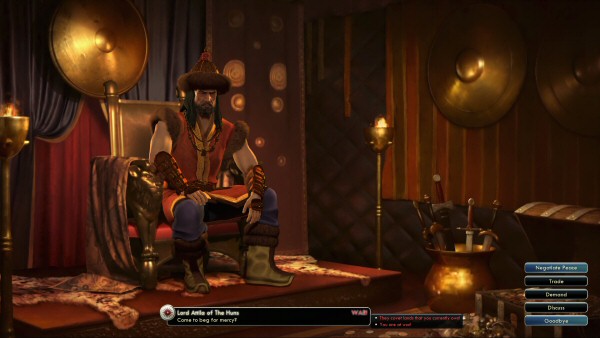
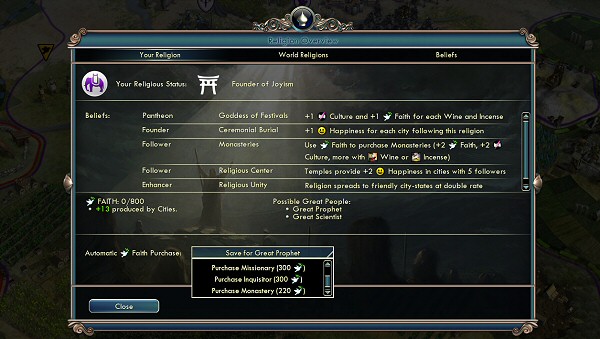
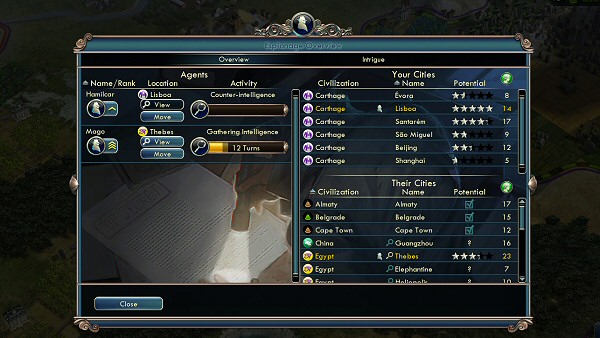
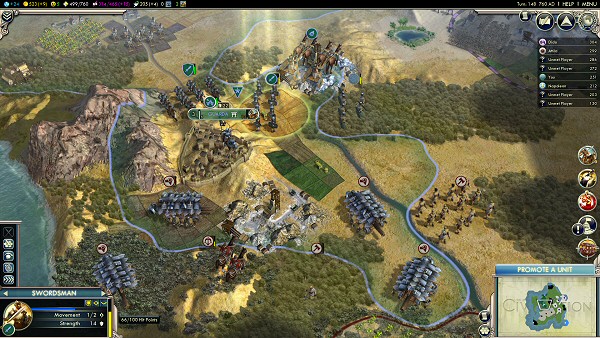
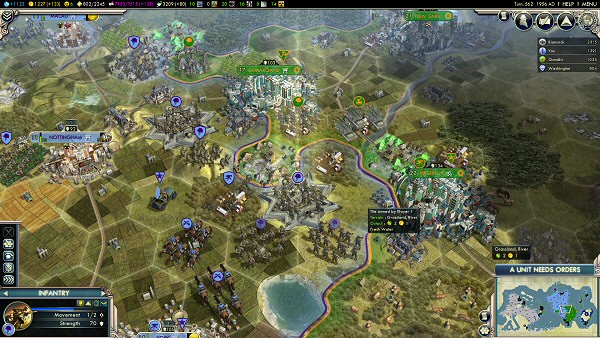
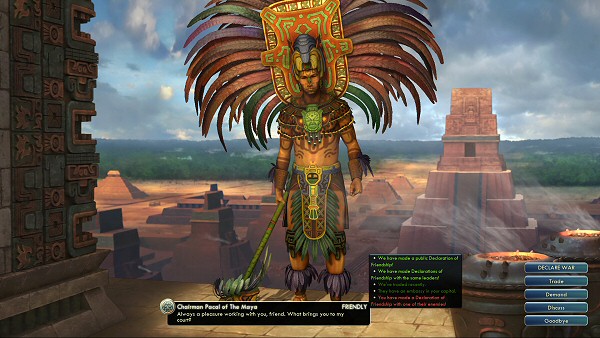
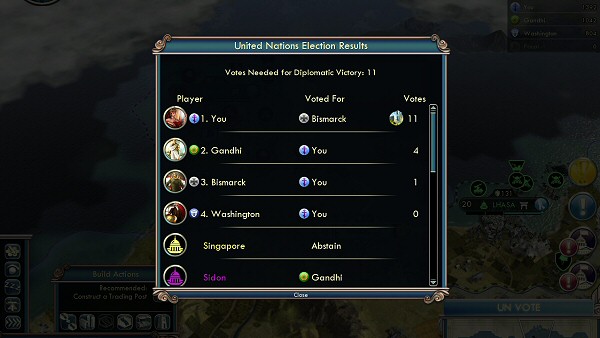







Nice review. I’ve had G&K for about 75% of a single play through.
* I’ve seen barbarians plunder improvements, in both versions of CivV — but i think they prefer to attack units.
* I disagree that the road changes dumb-down the game. Actually they make it deeper. Previously you never had to think much about roadbuilding– there was never a downside to having more roads, so eventually you (or the auto-worker) put roads everywhere. Now with CivV each road tile has a gold cost. So unless you have more gold than you can spend, you need to think about where you put roads, or weather you should place them at all. Each road placement decision has a much greater strategic significance. That IMHO is what a strategy game should strive for.
True. The aspects you mention about roads in Civ5 are better, I agree. The simplification I was talking about is that you don’t need roads to connect resources now. That logistical aspect is gone. Yes, it was a pain in the neck when barbarians raided roads, but that pushed you to think twice on leaving your countryside completely undefended. Having roads costing a significant amount of money is indeed a good improvement from Civ4. Roads were a large enterprise in the old days (and still are).
Man I really want to play this game but we’re in total crunch mode. Can’t spare the 12 hours I know this will suck from my life!
Indeed. You CAN’T buy yet or we’ll not get StarDrive this year :D
You easily get yourself playing 4-6 hour sessions straight if you’re not careful. And that is what good games are all about. I remember playing Civ4 BTS for entire weekends. That didn’t happen in Civ5, but that’s back now with G&K. But, I guess you could always try to allocate 2h slots in the weekends. You could probably finish a standard pace / standard map in 2 weeks perhaps.
One thing the review didn’t mention is the price of this expansion, and it reminds me of Sins of Solar Empire: Rebellion problem. I’m not entirely convinced the expac is worth $30 (more than half the price of the base game on launch). As the review states, the expac improves on almost all the problems Civ 5 had at launch… but does it bring enough to the table for that price? I’m not sure.
SoSE: Rebellion is the same issue for me. I’ve read reviews and watched several games, but is there enough new content for $40 compared to Trinity? I don’t think so.
I will definitely buy G&Ks, but I think I’ll wait for a 50% sale (I would have paid $20 max, same for Rebellion).
Otherwise, great review. :)
I only mention the price on reviews when I think it’s necessary, as I did for Rebellion. $40 is way too much for someone who already owns Trinity or the Diplomacy expansion, and I’m not sure about $30 if you manage to get the discount through stardock.
In Gods & Kings I think the price is not too much of a factor. In my opinion the expansion is worth the $30 for what it adds and for what it fixes/balances. I don’t recall the price of Civ5 at release time but I guess it was around $40 – $50? That means around $70 – $80 for the complete package. I think it’s worth it. Too bad we had to wait for so long for this.
Best PC game review I’ve read in ages, maybe ever. VERY detailed – you obviously spent a lot of time with the game. And even more writing up this comprehensive review. Well played, Sir.
Wow!! Thanks a lot man. I’m glad you enjoyed my work.
Once again an outstanding review Adam. Your work is far above many professional journalist efforts.
Thanks a lot for your comment Enares. Much appreciated.
Great review, Adam. It sounds like they really redeemed themselves in your eyes with this expansion. The diplomacy sounds like it is spot on now. I wish we could get some of that same level of diplomatic love in our 4x space games. It really does make a huge difference in increasing a single player game’s replayability.
So true Keith. Diplomacy is really at the heart of a great 4X game. I also hope we can get the same level in space 4X games. I’m sure some things can be borrowed :) In fact, I’m sure that’s been happening already. A great diplomacy system makes the game feel alive and immersive, as you feel you’re really dealing with other factions in a believable environment. Otherwise it’s very easy to find things dull and repetitive :(
A nice summary of the game. I concur with most of what you wrote, except that I have seen barbarians plunder city resources in almost every game I’ve played – admittedly a minor point.
Strange that I have not :) They just wondered around the cities. I even thought sometimes “come on man, destroy that thing…”. What about roads? Have you seen them plunder roads?